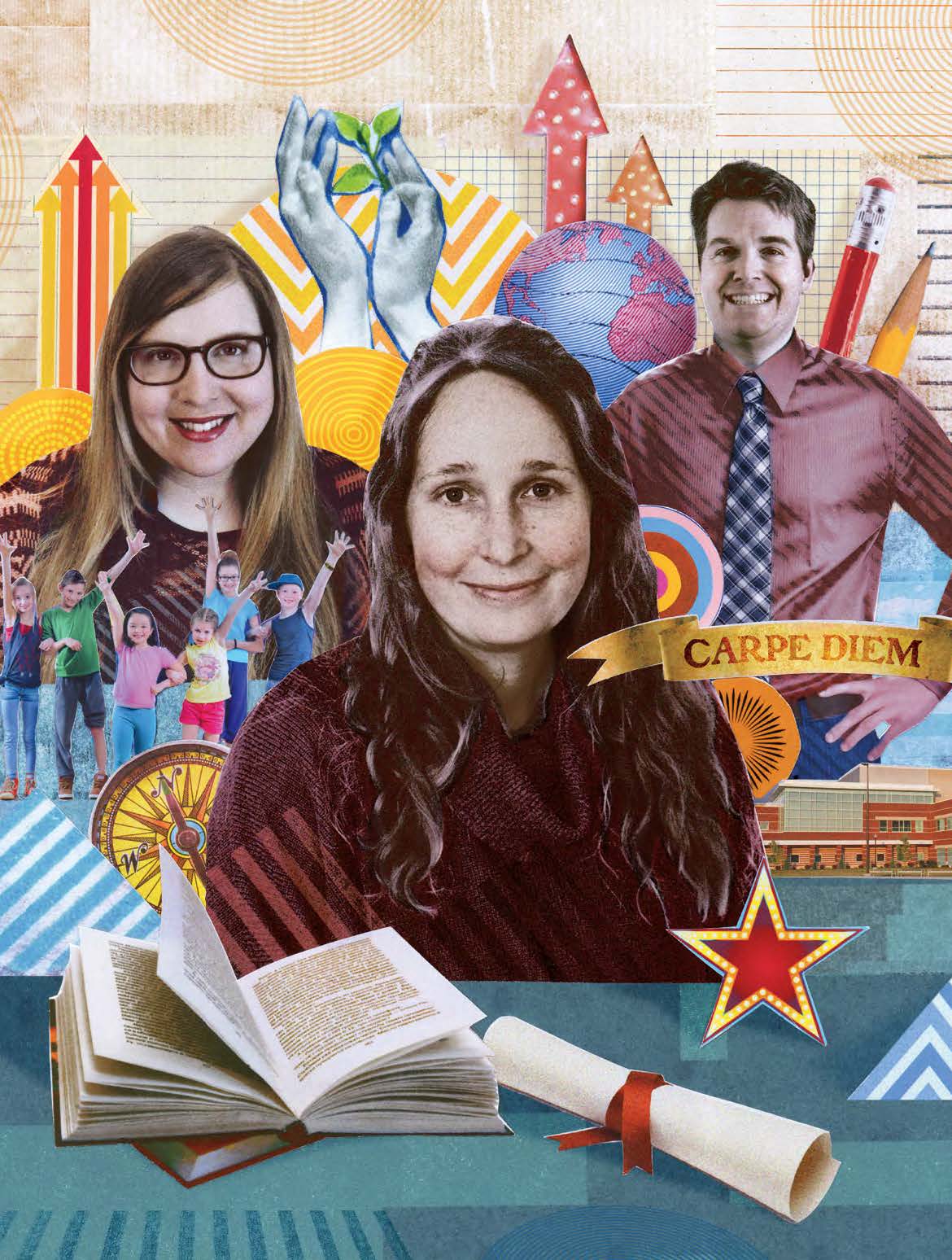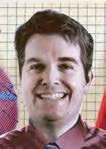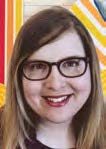Share this page
By Olivia Yu
Illustration: Martin O’Neill/Three in a Box; Left to Right: Shyla Pogany, OCT; Megan Hamilton Clifford, OCT; Christopher Carswell, OCT

Since 2003, the Ontario College of Teachers has recognized excellence in teacher education by awarding scholarships to help those studying to become teachers. We caught up with three of our past recipients to discuss their careers, how they connect with students, and their advice for new teachers.

2010 recipient of the Joseph W. Atkinson Scholarship for Excellence in Teacher Education
Christopher Carswell always knew he wanted to teach. You could even say he went into the family business — his father, stepmother and stepfather are all teachers. After graduating from the teacher education program at OISE/UT in Toronto, Carswell started teaching in private schools, putting his passion for different languages front and centre.
Now in his fifth year as a teacher, Carswell can be found teaching Latin at the University of Toronto Schools (UTS), an independent secondary school that admits students based on academic merit. He speaks proudly of the school and the work he does.
But teaching classical languages to high school students can be challenging, so finding a way to connect with students is key. “It begins with talking to them in a meaningful way,” says Carswell.
“Ask them about clubs they’re going to join, favourite TV shows and tying that to something in class. Find out whether they have a nickname they’d prefer to be called instead of their given name.”
He stresses the importance of going beyond the principles and philosophies of teaching. “New teachers are focused on what they learned, but there is so much more to teaching than just conveying information to students. Humanizing ourselves and being accessible will help build those relationships.”
Carswell also believes that to be effective in the classroom, teachers must be willing to be “lead learners” and show that they, too, are learning new things.
When asked what advice he would give new teachers, he warns against trying to be perfect for their students. “It’s counter-intuitive, but what’s key is to think back and look at what could be done better. By continuing to reflect, new teachers will get to where they want to be.”

2013 recipient Ontario College of Teachers Primary/Junior or Junior/Intermediate Scholarship
Most teachers have their own tricks when it comes to making the curriculum more interesting for their students. For Shyla Pogany, a long-term occasional teacher for the Upper Grand District School Board, it’s Zumba, a combination of dance and aerobic movements performed to lively music.
In less than three months, Pogany and her students have choreographed at least 12 dances as part of their daily physical activity program.
“I try to incorporate what interests me into class, and I encourage my students to do the same,” she says of her Grade 5/6 class. “I find students much more receptive when they have a say in the way they learn.”
In fact, Pogany works closely with every student to try to make sure there’s something interesting for everyone. She differentiates instructions as needed to ensure each student has the accommodations they need to be successful. “Everyone learns differently. You need to find ways that speak to each student and wait for that ‘aha!’ moment.”
Pogany strives to find the tools that will help her students learn best. But finding the tools isn’t enough, she stresses. Setting goals together so that students take ownership of their learning and continually build on those goals, helps them develop a growth and resiliency mindset. And it’s OK if students don’t succeed. “Failure is the first attempt at learning. It’s OK to make mistakes.”
She also encourages her class to build their own community and to learn how to resolve issues among themselves.
“We have classroom community agreements posted on the wall. I think it’s important to give students opportunities for self-reflection and self-regulation. And if there are problems, they can refer to the agreements.”
Pogany, who teaches primarily in the Guelph area, continues to hone her craft and considers herself still new to the teaching profession.
“I’m often the one asking for advice, and I would urge all new teachers to do the same,” she says. “Use the resources around you. Go and ask other teachers. Share curriculum, share ideas and share lessons. Learn.”

2007 recipient, Joseph W. Atkinson Scholarship for Excellence in Teacher Education
Megan Hamilton Clifford is extremely proud to be a part of Limestone District School Board’s “A” Team. Also known as the Autism Team, it is a group of educators created to meet the needs of exceptional learners. Clifford and her colleagues aren’t part of a traditional brick-and-mortar institution for students to attend. Instead, they work with students in different schools from the City of Kingston to the counties of Frontenac, Lennox and Addington, going where they are needed most.
After graduating from Lakehead University, Clifford taught elementary students and then secondary French while continuing her studies through Additional Qualification courses, including Special Education. It was then that Clifford knew she wanted to work with special needs students.
“I find the kids really inspiring. We don’t live in the most accepting of worlds and those students face extra challenges. I love watching them grow, thrive and overcome those barriers.”
Clifford celebrates her students’ accomplishments, big and small. Even something like learning how to make orange juice from concentrate is a reason to rejoice. Every development is a stepping stone that helps students reach their long-term goals. “I have students who are now in university, who are doing amazing things.”
As a Special Education teacher, Clifford struggles with the term “developmental disability,” which is commonly used to describe her students. “I don’t like the word disability. It’s not a lesser way of seeing the world — it’s just a different way.”
It is her ability to put herself in others’ shoes that helps her better understand her students and to “see the whole student; not just the child who didn’t do their homework.” Clifford says that it’s important to take into account other things that may be happening in a student’s life.
Over the years, Clifford has learned many different things, but the biggest lesson she learned — and advice she wants new teachers to heed is “to forgive yourself for your mistakes, because you’re going to make them.” She also adds that “the mistakes are as informative as what goes well.”
Clifford also took the time to reflect on her scholarship from the College and what it meant to her. “It was really encouraging to have recognition as a young educator. It made a big difference to have the professional recognition and the economic boost up. I was really grateful to receive the scholarship.”
The Ontario College of Teachers Scholarship Program awards scholarships that provide financial support to teacher candidates. The program identifies exemplary role models and pays direct financial assistance to those with a passion for and dedication to the highest ideals of teaching. Financial awards are made possible through donations. Awards are paid directly to individuals in accordance with the College’s criteria. For more information, please visit oct-oeeo.ca/8g82sz.